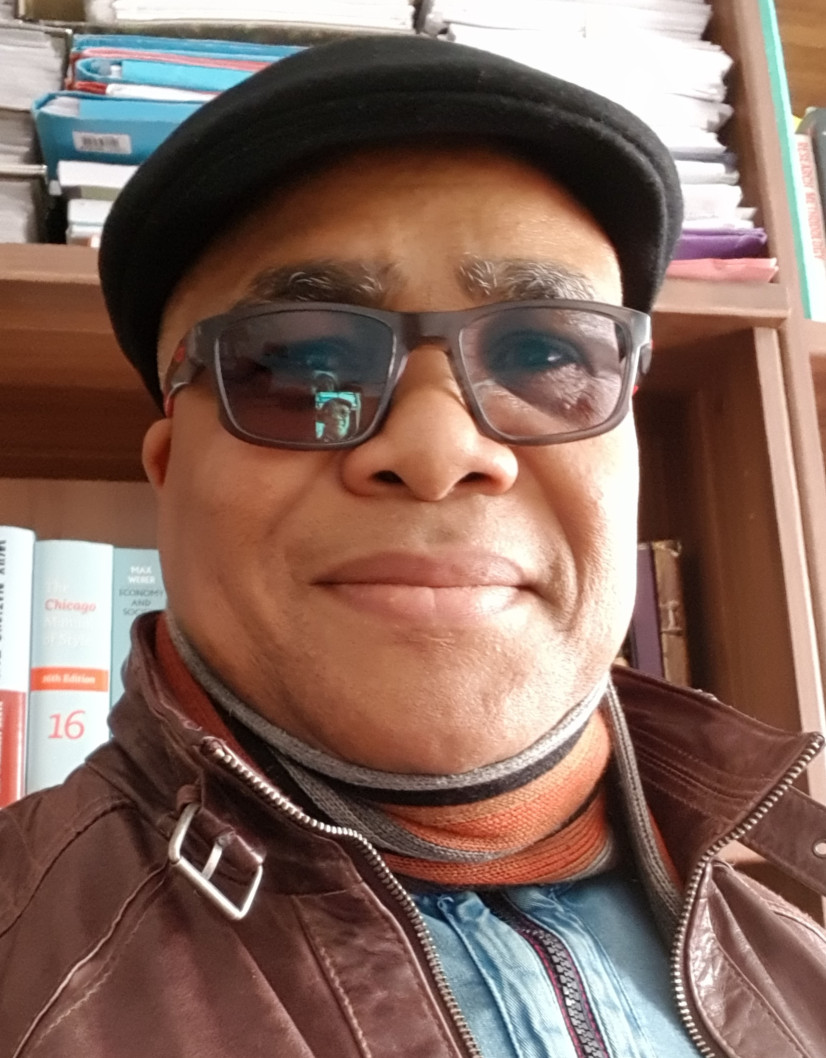
Asonzeh Ukah, Dr. phil.
Professor and Chair of the Study of Religions, Director of the African Centre for Religions, Ethics, and Society
University of Cape Town
Born in 1965 in Takoradi, Ghana
BA in Comparative Religions, MA in Sociology of Religion, and MSc in Industrial Sociology from the University of Ibadan, Dr. phil. in History of Religions from the University of Bayreuth
Project
Infrasacred Formations: The Moral Economies of Sacred Space in Africa
My project intends to interrogate the conceptualisation, practice, and meaning of apocalyptic politics as embedded in the material constructions of religious structures in secular urban environments in two African cities, Lagos in Nigeria and Kampala in Uganda. Because of the influence of Christianity and Christian scholars, until recently the history of the academic study of religion was dominated by the focus on dogma, beliefs, rituals, ceremonies, and morality. Recently, however, a materialist turn has started paying critical attention to the role of material objects, visuality, aesthetics, and images in the construction of belief and the social significance of religion, lived religion, and religious community. Following on the heels of this materialist gaze is another significant intervention, that of a spatial turn in understanding the role of place in the constitution and construction of religious identity, autonomy, sacred practices, and community (of) belief and unbelief. My research engages with and contributes to these two significant scholarly trajectories in the academic study of religion: materialist and spatial turns in understanding the role and place of religious social transformation in Africa. I have done ethnographic fieldwork in some prayer camps or ritual retreat centres in or on the fringes of large African cities under the “Miracle Cities Project,” a comparative research project I managed from 2016 onwards. However, there are aspects of my research that are yet to be fully analysed and reported, which will be the focus of my attention during my time at the Wissenschaftskolleg zu Berlin. Using data from Lagos (Nigeria) and Kampala (Uganda), I am particularly interested in the intersection of sacred infrastructural formations and constructions within Prayer Camps and ongoing political and economic restructuring in urban Africa in contemporary times. My research underscores a central feature of ongoing transformations in Africa resulting in arguably the most profound changes in the realm of the religious, especially in the making, remaking, and unmaking of sacred spaces and places. These changes have given rise to new forms of urbanities, spectacularisation of religious identities, and new practices of city-making that intersect and interrogate modern concepts and practices of cities and secularities, as well as inform the emergence of apocalyptic politics, attempts at political restructuring based on claimed revealed insights from metasocial sources.Recommended Reading
Ukah, Asonzeh. “Emplacing God: The Social Worlds of Miracle Cities – Perspectives from Nigeria and Uganda.” Journal of Contemporary African Studies 36, no. 3 (2018): 351–368. https://doi.org/10.1080/02589001.2018.1492094.
–. “‘God Reloaded’: The Pentecostal Political Transgression and Africa’s Non-secularity.” In Religion in the Era of Postsecularism, edited by Uchenna Okeja, 148–170. London and New York: Routledge, 2020.
–. “Sacred Surplus and Pentecostal Too-Muchness: The Salvation Economy of African Megachurches.” In Handbook of Megachurches, edited by Stephen Hunt, 323–344. Leiden: Brill, 2020.
Colloquium, 15.04.2025
Regulating Deregulation: Rights vs. Rites in Africa’s Governance of Religious Organisations
In Africa, especially south of the Sahara Desert, religion and religiosity are not matters of private practice, consigned and confined to the non-public realms. Religious ideas, and personalities have been at the forefront of socio-political contestations under late modernity, neoliberal market expansion, and technological penetration. In recent decades, many postcolonial African States – which are not radically different from their colonial predecessors – have been grappling with ways and methods to effectively reconcile constitutional guarantees of rights under deregulated religious markets, on the one hand, and public safety, on the other, and to reasonably accommodate the free exercise of religion within increasingly plural societies. New laws and legal frameworks are being put in place or are being considered for the management of religious rights, freedoms, and practices. Under the context of rights, especially human rights, these attempts have been controversial and hotly debated in the public square. To understand the challenges and trajectory of socio-political change, it is crucial to examine some of these frameworks and search for explanations for their contexts and purpose in the process of the complex commingling and entanglement of religion, law, and the postcolonial state in contemporary Africa.
Publications from the Fellow Library
Ukah, Asonzeh (Belgrade, 2022)
Banishing miracles : politics and policies of religious broadcasting in Nigeria
Ukah, Asonzeh (Wiesbaden, 2020)
Wundermanagement - Gesetz, Autorität und Regulierung religiösen Rundfunks in Nigeria
Ukah, Asonzeh (Leiden, 2020)
Sacred surplus and pentecostal too-muchness : the salvation economy of African megachurches
Ukah, Asonzeh ([Pretoria], 2018)
Ukah, Asonzeh (London, 2018)
Emplacing god : the social worlds of miracle cities – perspectives from Nigeria and Uganda
Ukah, Asonzeh (Stellenbosch, 2016)
Prophecy, miracle and tragedy : the afterlife of T.B. Joshua's ministry and the Nigerian state
Ukah, Asonzeh (Bloomington, 2015)
Managing miracles : law, authority, and the regulation of religious broadcasting in Nigeria
Ukah, Asonzeh (Stellenbosch, 2015)
Obeying Caesar to obey God : the dilemmas of registering of religious organisations in Nigeria